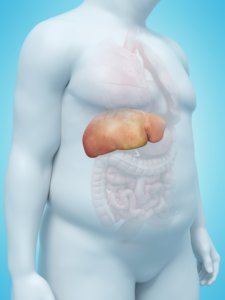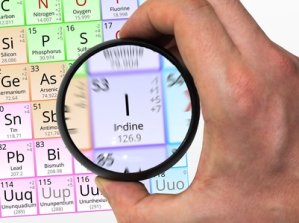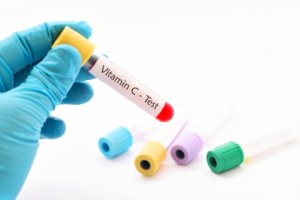 It has been known for a long time that a lack of vitamin D increases your risk of overweight. Now, an Italian study gives a whole new view on low vitamin D and how it is linked to elevated levels of TMAO (Trimethylamine N-oxide), a metabolite that increases the risk of non-alcoholic fatty liver and accompanying complications such as insulin resistance, diabetes, and cardiovascular disease. The scientists also looked at the gut flora’s and the liver’s roles in TMAO production and the fact that low vitamin D levels and overweight are a vicious cycle. It appears that overweight people need more vitamin D than the recommended level. In terms of non-alcoholic fatty liver, we will also be looking at the controversial delicacy, foie gras, and the fact that carbohydrate overconsumption burdens your liver.
It has been known for a long time that a lack of vitamin D increases your risk of overweight. Now, an Italian study gives a whole new view on low vitamin D and how it is linked to elevated levels of TMAO (Trimethylamine N-oxide), a metabolite that increases the risk of non-alcoholic fatty liver and accompanying complications such as insulin resistance, diabetes, and cardiovascular disease. The scientists also looked at the gut flora’s and the liver’s roles in TMAO production and the fact that low vitamin D levels and overweight are a vicious cycle. It appears that overweight people need more vitamin D than the recommended level. In terms of non-alcoholic fatty liver, we will also be looking at the controversial delicacy, foie gras, and the fact that carbohydrate overconsumption burdens your liver.
 B vitamins are water-soluble and because they do not get stored in the body, we humans depend on regular intake of them. B vitamins work in synergy in a highly complicated teamwork setup. They take part in most of the body's enzymatic processes, some more actively than others. The uptake of B vitamins depends on gastric acid and digestion.
B vitamins are water-soluble and because they do not get stored in the body, we humans depend on regular intake of them. B vitamins work in synergy in a highly complicated teamwork setup. They take part in most of the body's enzymatic processes, some more actively than others. The uptake of B vitamins depends on gastric acid and digestion.
- and a common trait in most chronic diseases
 Although chronic inflammation is not something that you feel as such, it sets the stage for a number of symptoms and a host of different diseases including fatigue, overweight, diabetes, cardiovascular disease, rheumatism, metabolic disorders, asthma, periodontal disease, bowel infections, depression, Alzheimer’s disease, sclerosis, and cancer. Not surprisingly, people are more and more hooked on the anti-inflammatory lifestyle, and we will take a closer look at studies showing how fish oil, vitamin D, selenium, magnesium, and zinc contribute to preventing and fighting inflammation, related diseases and premature death. Any nutritional supplements must be of a proper quality that the body can absorb, and they should contain therapeutic dosages.
Although chronic inflammation is not something that you feel as such, it sets the stage for a number of symptoms and a host of different diseases including fatigue, overweight, diabetes, cardiovascular disease, rheumatism, metabolic disorders, asthma, periodontal disease, bowel infections, depression, Alzheimer’s disease, sclerosis, and cancer. Not surprisingly, people are more and more hooked on the anti-inflammatory lifestyle, and we will take a closer look at studies showing how fish oil, vitamin D, selenium, magnesium, and zinc contribute to preventing and fighting inflammation, related diseases and premature death. Any nutritional supplements must be of a proper quality that the body can absorb, and they should contain therapeutic dosages.
 It appears so. Iodine is an essential trace element that is vital for metabolism and estrogen balance. Iodine also helps the body get rid of environmental toxins. In fact, exposure to these toxins increases our need for iodine, and many experts believe that the official recommendations for iodine are too low.
It appears so. Iodine is an essential trace element that is vital for metabolism and estrogen balance. Iodine also helps the body get rid of environmental toxins. In fact, exposure to these toxins increases our need for iodine, and many experts believe that the official recommendations for iodine are too low.
 Women from the age of 50 years and older have an increased risk of blood sugar problems, weight problems, cardiovascular disease, and metabolic syndrome, if they lack vitamin D, according to a new study from Sao Paulo in Brazil. If you want to control your blood sugar levels and lose weight, it is not sufficient to eat less and work out at the gym. You also need sun exposure (without getting burned), because the summer sun is our richest source of vitamin D. You may even want to take a vitamin D supplement during the winter period.
Women from the age of 50 years and older have an increased risk of blood sugar problems, weight problems, cardiovascular disease, and metabolic syndrome, if they lack vitamin D, according to a new study from Sao Paulo in Brazil. If you want to control your blood sugar levels and lose weight, it is not sufficient to eat less and work out at the gym. You also need sun exposure (without getting burned), because the summer sun is our richest source of vitamin D. You may even want to take a vitamin D supplement during the winter period.
 Metabolic syndrome, which is an early stage of diabetes, is spreading like a bushfire. This condition is characterized by overweight, hypertension, hypercholesterolemia, and disrupted blood sugar metabolism. The diet plays a major role, and scientists have found a direct link between the intake and serum levels of vitamin B6, folic acid (vitamin B9), and vitamin B12, according to a large American population study that is published in JAMA Network Open. The authors also address how these B vitamins can help improve the glucose metabolism and prevent metabolic syndrome.
Metabolic syndrome, which is an early stage of diabetes, is spreading like a bushfire. This condition is characterized by overweight, hypertension, hypercholesterolemia, and disrupted blood sugar metabolism. The diet plays a major role, and scientists have found a direct link between the intake and serum levels of vitamin B6, folic acid (vitamin B9), and vitamin B12, according to a large American population study that is published in JAMA Network Open. The authors also address how these B vitamins can help improve the glucose metabolism and prevent metabolic syndrome.
 A higher intake of vitamin C is essential for people with insulin resistance and metabolic syndrome, both of which are early stages of type 2 diabetes. The reason for this, according to scientists from Oregon State University in the United States, is that vitamin C is a powerful antioxidant that helps protect against the damage that oxidative stress causes to our cells and cardiovascular system. The question is, how do we make sure to get enough vitamin C, and is eating loads of fruit and drinking a lot of juice a good or bad solution?
A higher intake of vitamin C is essential for people with insulin resistance and metabolic syndrome, both of which are early stages of type 2 diabetes. The reason for this, according to scientists from Oregon State University in the United States, is that vitamin C is a powerful antioxidant that helps protect against the damage that oxidative stress causes to our cells and cardiovascular system. The question is, how do we make sure to get enough vitamin C, and is eating loads of fruit and drinking a lot of juice a good or bad solution?
 A selenium deficiency may increase the risk of gluten intolerance/celiac disease, which can lead to metabolic disorders and vice versa. Because selenium deficiencies may be a result of eating a poor diet and suffering from malabsorption, this may easily turn into a vicious cycle.
A selenium deficiency may increase the risk of gluten intolerance/celiac disease, which can lead to metabolic disorders and vice versa. Because selenium deficiencies may be a result of eating a poor diet and suffering from malabsorption, this may easily turn into a vicious cycle.
 A substantial number of people suffer from Hashimoto’s disease, a condition that causes hypothyroidism (slow metabolism), extreme fatigue, cold sensitivity, weight gain, and numerous other symptoms because the cells lack energy. Quite a few people suffering from this disease receive treatment, but the results are often unsatisfactory, and most people have not been given the correct diagnosis or do not receive proper help.
A substantial number of people suffer from Hashimoto’s disease, a condition that causes hypothyroidism (slow metabolism), extreme fatigue, cold sensitivity, weight gain, and numerous other symptoms because the cells lack energy. Quite a few people suffering from this disease receive treatment, but the results are often unsatisfactory, and most people have not been given the correct diagnosis or do not receive proper help.
 Hormonal imbalances have broad implications and increase the risk of chronic fatigue, overweight, impaired fertility, dry mucosa, hot flushes, slow metabolism, breast cancer, and many other problems. Lack of essential nutrients contributes to such disruptions of the sensitive hormone system. This is also the case with hormone-disrupting compounds.
Hormonal imbalances have broad implications and increase the risk of chronic fatigue, overweight, impaired fertility, dry mucosa, hot flushes, slow metabolism, breast cancer, and many other problems. Lack of essential nutrients contributes to such disruptions of the sensitive hormone system. This is also the case with hormone-disrupting compounds.
 Magnesium supports hundreds of different enzyme processes that are involved in energy turnover, sugar metabolism, nerves, and several other basic functions. Unfortunately, magnesium deficiency is rather common and more and more studies suggest that this may be related to a host of metabolic disturbances such as overweight, insulin resistance, type 2 diabetes, hypertension, elevated cholesterol, and chronic low-grade inflammation that is seen in connection with most chronic diseases. On the other and, it appears that high intake of magnesium from the diet or from supplements may help. In a new review article that is published in Nutrients, the authors look at magnesium deficiency and its role in the development of metabolic disorders. They also look at factors such as nutrient-depleted farmland, unhealthy diets, poor nutrient uptake, insulin resistance, the use of medicine, alcohol abuse, and stress that can potentially result in a magnesium deficiency.
Magnesium supports hundreds of different enzyme processes that are involved in energy turnover, sugar metabolism, nerves, and several other basic functions. Unfortunately, magnesium deficiency is rather common and more and more studies suggest that this may be related to a host of metabolic disturbances such as overweight, insulin resistance, type 2 diabetes, hypertension, elevated cholesterol, and chronic low-grade inflammation that is seen in connection with most chronic diseases. On the other and, it appears that high intake of magnesium from the diet or from supplements may help. In a new review article that is published in Nutrients, the authors look at magnesium deficiency and its role in the development of metabolic disorders. They also look at factors such as nutrient-depleted farmland, unhealthy diets, poor nutrient uptake, insulin resistance, the use of medicine, alcohol abuse, and stress that can potentially result in a magnesium deficiency.
 It has been known for a long time that a lack of vitamin D increases your risk of overweight. Now, an Italian study gives a whole new view on low vitamin D and how it is linked to elevated levels of TMAO (Trimethylamine N-oxide), a metabolite that increases the risk of non-alcoholic fatty liver and accompanying complications such as insulin resistance, diabetes, and cardiovascular disease. The scientists also looked at the gut flora’s and the liver’s roles in TMAO production and the fact that low vitamin D levels and overweight are a vicious cycle. It appears that overweight people need more vitamin D than the recommended level. In terms of non-alcoholic fatty liver, we will also be looking at the controversial delicacy, foie gras, and the fact that carbohydrate overconsumption burdens your liver.
It has been known for a long time that a lack of vitamin D increases your risk of overweight. Now, an Italian study gives a whole new view on low vitamin D and how it is linked to elevated levels of TMAO (Trimethylamine N-oxide), a metabolite that increases the risk of non-alcoholic fatty liver and accompanying complications such as insulin resistance, diabetes, and cardiovascular disease. The scientists also looked at the gut flora’s and the liver’s roles in TMAO production and the fact that low vitamin D levels and overweight are a vicious cycle. It appears that overweight people need more vitamin D than the recommended level. In terms of non-alcoholic fatty liver, we will also be looking at the controversial delicacy, foie gras, and the fact that carbohydrate overconsumption burdens your liver.











 B vitamins are water-soluble and because they do not get stored in the body, we humans depend on regular intake of them. B vitamins work in synergy in a highly complicated teamwork setup. They take part in most of the body's enzymatic processes, some more actively than others. The uptake of B vitamins depends on gastric acid and digestion.
B vitamins are water-soluble and because they do not get stored in the body, we humans depend on regular intake of them. B vitamins work in synergy in a highly complicated teamwork setup. They take part in most of the body's enzymatic processes, some more actively than others. The uptake of B vitamins depends on gastric acid and digestion. Although chronic inflammation is not something that you feel as such, it sets the stage for a number of symptoms and a host of different diseases including fatigue, overweight, diabetes, cardiovascular disease, rheumatism, metabolic disorders, asthma, periodontal disease, bowel infections, depression, Alzheimer’s disease, sclerosis, and cancer. Not surprisingly, people are more and more hooked on the anti-inflammatory lifestyle, and we will take a closer look at studies showing how fish oil, vitamin D, selenium, magnesium, and zinc contribute to preventing and fighting inflammation, related diseases and premature death. Any nutritional supplements must be of a proper quality that the body can absorb, and they should contain therapeutic dosages.
Although chronic inflammation is not something that you feel as such, it sets the stage for a number of symptoms and a host of different diseases including fatigue, overweight, diabetes, cardiovascular disease, rheumatism, metabolic disorders, asthma, periodontal disease, bowel infections, depression, Alzheimer’s disease, sclerosis, and cancer. Not surprisingly, people are more and more hooked on the anti-inflammatory lifestyle, and we will take a closer look at studies showing how fish oil, vitamin D, selenium, magnesium, and zinc contribute to preventing and fighting inflammation, related diseases and premature death. Any nutritional supplements must be of a proper quality that the body can absorb, and they should contain therapeutic dosages. It appears so. Iodine is an essential trace element that is vital for metabolism and estrogen balance. Iodine also helps the body get rid of environmental toxins. In fact, exposure to these toxins increases our need for iodine, and many experts believe that the official recommendations for iodine are too low.
It appears so. Iodine is an essential trace element that is vital for metabolism and estrogen balance. Iodine also helps the body get rid of environmental toxins. In fact, exposure to these toxins increases our need for iodine, and many experts believe that the official recommendations for iodine are too low. Women from the age of 50 years and older have an increased risk of blood sugar problems, weight problems, cardiovascular disease, and metabolic syndrome, if they lack
Women from the age of 50 years and older have an increased risk of blood sugar problems, weight problems, cardiovascular disease, and metabolic syndrome, if they lack  Metabolic syndrome, which is an early stage of diabetes, is spreading like a bushfire. This condition is characterized by overweight, hypertension, hypercholesterolemia, and disrupted blood sugar metabolism. The diet plays a major role, and scientists have found a direct link between the intake and serum levels of
Metabolic syndrome, which is an early stage of diabetes, is spreading like a bushfire. This condition is characterized by overweight, hypertension, hypercholesterolemia, and disrupted blood sugar metabolism. The diet plays a major role, and scientists have found a direct link between the intake and serum levels of  A higher intake of
A higher intake of  A
A  A substantial number of people suffer from Hashimoto’s disease, a condition that causes hypothyroidism (slow metabolism), extreme fatigue, cold sensitivity, weight gain, and numerous other symptoms because the cells lack energy. Quite a few people suffering from this disease receive treatment, but the results are often unsatisfactory, and most people have not been given the correct diagnosis or do not receive proper help.
A substantial number of people suffer from Hashimoto’s disease, a condition that causes hypothyroidism (slow metabolism), extreme fatigue, cold sensitivity, weight gain, and numerous other symptoms because the cells lack energy. Quite a few people suffering from this disease receive treatment, but the results are often unsatisfactory, and most people have not been given the correct diagnosis or do not receive proper help. Hormonal imbalances have broad implications and increase the risk of chronic fatigue, overweight, impaired fertility, dry mucosa, hot flushes, slow metabolism, breast cancer, and many other problems. Lack of essential nutrients contributes to such disruptions of the sensitive hormone system. This is also the case with hormone-disrupting compounds.
Hormonal imbalances have broad implications and increase the risk of chronic fatigue, overweight, impaired fertility, dry mucosa, hot flushes, slow metabolism, breast cancer, and many other problems. Lack of essential nutrients contributes to such disruptions of the sensitive hormone system. This is also the case with hormone-disrupting compounds.
 "After about one week of taking the Q10 supplement I could feel a huge difference," says 23-year old Alan Piccini, who has been suffering from extreme fatigue and muscle aches ever since he was a child.
"After about one week of taking the Q10 supplement I could feel a huge difference," says 23-year old Alan Piccini, who has been suffering from extreme fatigue and muscle aches ever since he was a child. “Taking capsules with co-enzyme Q10 has freed me of the severe side effects of my cholesterol lowering medicine,” Mrs Franken explains.
“Taking capsules with co-enzyme Q10 has freed me of the severe side effects of my cholesterol lowering medicine,” Mrs Franken explains.